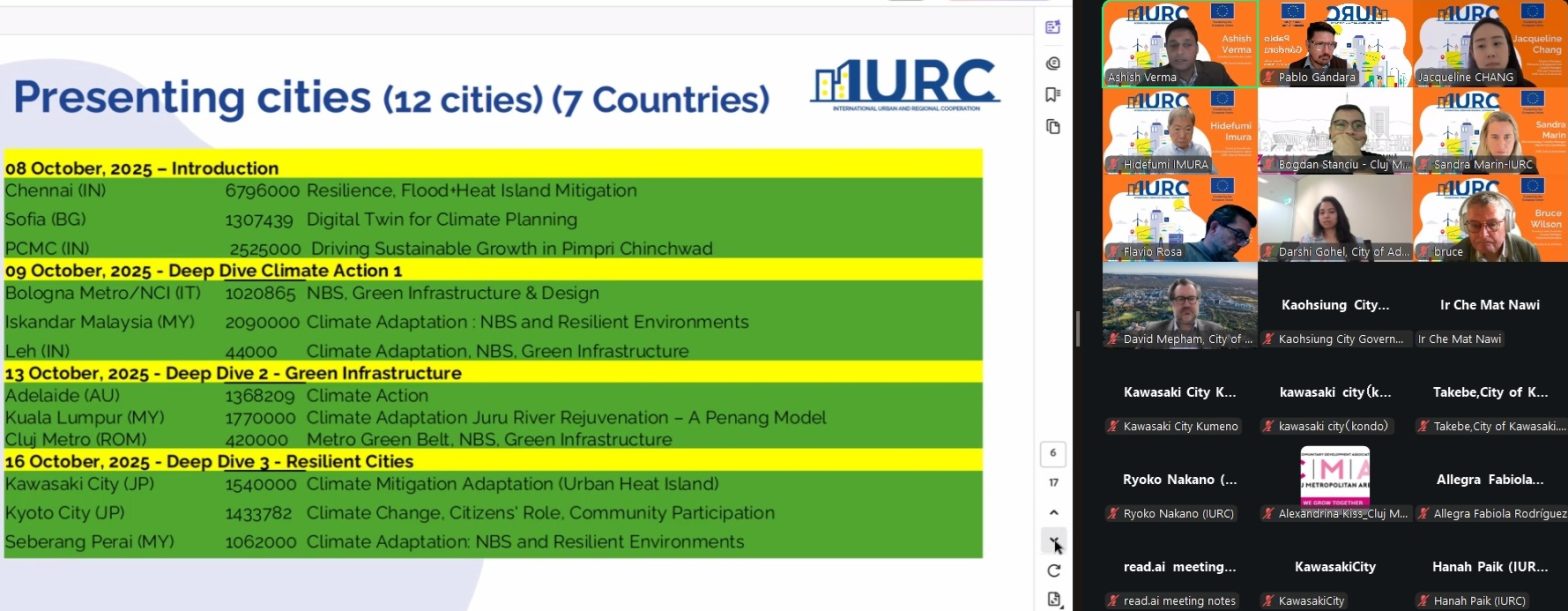13 October 2025 – Online Deep Dive Session
The International Urban and Regional Cooperation (IURC) Asia & Australasia Thematic Network held its second Global Deep Dive on Climate Adaptation, focusing on Nature-Based Solutions (NbS), Financing Strategies, and Community Involvement. The session gathered experts and representatives from Adelaide (Australia), Kuala Lumpur (Malaysia), and the Cluj Metropolitan Area (Romania) to exchange practical experiences and inspire cross-regional learning.
From Strategy to Implementation
Opening the session, Mr. Ashish Verma, Country Coordinator and Cluster Manager for IURC Asia & Australasia, recalled the insights from the first Deep Dive earlier in October, which had set the framework for adaptation strategies. This second discussion, he noted, moved beyond planning into implementation—emphasizing how NbS, financing tools, and community participation converge to create lasting resilience.
Mr. Verma highlighted that effective adaptation “requires integrating natural ecosystems, digital innovation, and inclusive governance.” He stressed that the IURC’s city-to-city platform provides a unique opportunity for peer learning, helping local governments in Asia and Europe accelerate innovation and replicate successful approaches.
Adelaide: Greening the City, Empowering the People
Mr. David Mepham, Manager of Low Carbon & Circular Economy at the City of Adelaide, presented how Adelaide combines climate action with urban livability through green infrastructure and citizen participation. The city has expanded its urban canopy, adopted data-driven tools to monitor heat islands, and promoted biodiversity programs involving residents and local schools.
Mr. Mepham explained that Adelaide’s low-carbon vision extends to energy, transport, and waste management systems, supporting a circular economy and improved quality of life. “Our approach connects every household to the city’s climate goals—because sustainability succeeds only when people are part of the solution,” he said.

Kuala Lumpur: Harnessing Nature for Water and Flood Resilience
Ir. Che Mat Nawi Bin Mat Daud, Deputy Director at the Department of Civil Engineering and Drainage, Kuala Lumpur City Hall, shared the city’s evolving approach to flood management. Kuala Lumpur combines traditional engineering with NbS to tackle urban flooding—through retention ponds, green corridors, wetlands, and sustainable urban drainage systems (SUDS).
He detailed how the city’s short-, medium-, and long-term plans ensure project continuity across administrations. Financial planning and inter-agency coordination remain crucial for scalability. “By blending infrastructure with nature, we are redefining resilience—not as resistance, but as flexibility and coexistence with natural systems,” he said.
The Kuala Lumpur experience highlighted the importance of aligning financial strategies with ecological design, offering a practical model for other IURC cities navigating similar challenges.

Cluj Metropolitan Area: Citizens at the Heart of Climate Neutrality
Representing Europe, Mr. Bogdan Stanciu, Communications Manager at the Cluj Metropolitan Area Intercommunity Development Association, presented Cluj’s roadmap toward becoming a climate-neutral metropolitan area by 2030. The city’s transformation is deeply community-driven, with citizens co-designing green spaces and riverfronts.
Key initiatives include the green regeneration of the Somesh River corridor, the creation of urban forest parks, and large-scale investments in green mobility and renewable energy systems. Cluj leverages Horizon Europe and other EU funding programmes to connect innovation with participation.
“Co-creation is not a buzzword in Cluj—it’s the foundation of how we build our future city,” said Mr. Stanciu. “Every tree planted and every bike lane built reflects a shared decision.”

Finance, Nature, and People at the Core
The closing discussion brought forward the shared insight that effective adaptation depends equally on finance, natural systems, and people. Participants noted that sustainable progress emerges from multi-level governance, access to innovative finance, and strong community ownership.
Mr. Verma concluded by thanking the speakers and reaffirming that IURC remains a platform for learning, innovation, and partnership. “From Adelaide’s canopy streets to Cluj’s green rivers and Kuala Lumpur’s flood-resilient corridors,” he said, “cities across continents are showing how nature and people together can shape resilient, inclusive urban futures.”
